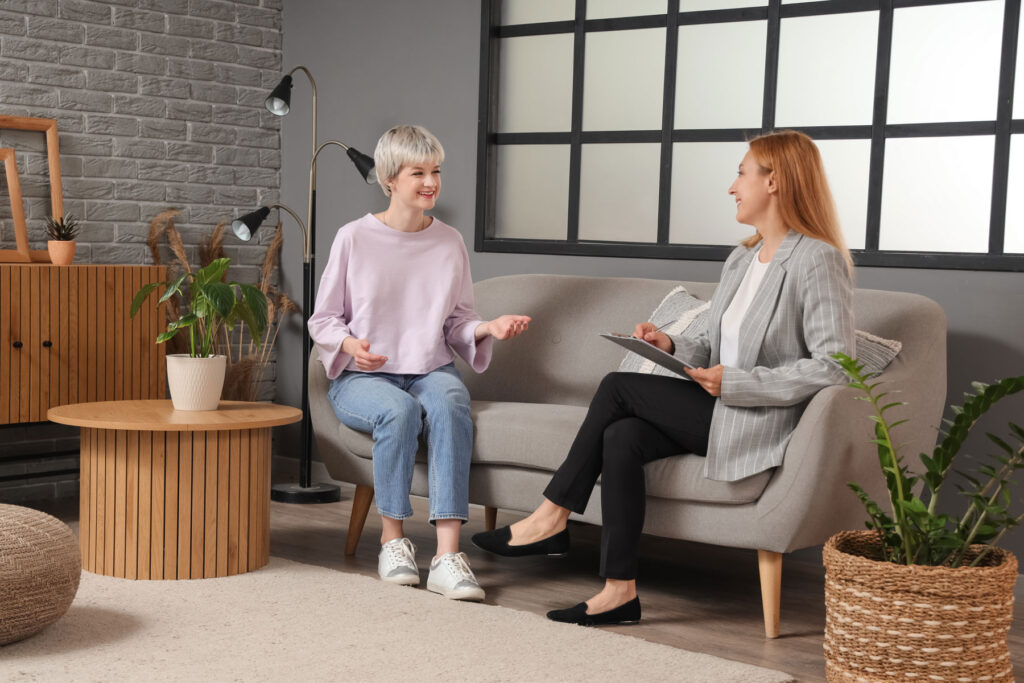Starting substance abuse counseling can feel overwhelming, especially if you’re unsure what to expect. If you’re a woman seeking support, understanding the process can ease anxiety and help you prepare for your first session. The Willows at Red Oak Recovery® offers substance abuse counseling in North Carolina for women who are seeking support and addiction recovery. Our team can walk you through the expectations for your first session and how to prepare so you can get the most out of your sessions.
Goals of your first addiction therapy session
Your first counseling session is an opportunity to build a foundation for your recovery journey. The primary goals include:
- Establishing rapport: Building a trusting relationship with your therapist is crucial.
- Gathering information: Your therapist will ask about your substance use history, mental health, and personal background to understand your unique situation.
- Setting initial goals: Together, you’ll identify immediate concerns and outline preliminary objectives for your therapy.
This session sets the stage for a personalized treatment plan tailored to your needs.
Common substance use assessment questions and why they’re asked
During your first session, your therapist will ask various questions to assess your situation. These questions help create an effective treatment plan. Common questions include:
- What substances are you using, and how often?
- When did you start using substances?
- Have you tried to quit before?
- Do you have any co-occurring mental health conditions?
- What is your support system like?
These questions are not meant to judge but to better understand your experiences and challenges.
How to prepare emotionally and logistically for addiction counseling
Preparing for your first session of addiction counseling can make the experience more comfortable:
Emotionally:
- Acknowledge any feelings of anxiety or fear. It’s normal to feel nervous.
- Remind yourself that seeking help is a courageous step.
Logistically:
- Bring necessary documents like identification, insurance information, and medical records.
- Make a list of any medications you take.
- Plan transportation to ensure you arrive on time.
- Write down any questions or concerns you want to discuss.
Being prepared can help you feel more in control and focused during your session.
Setting expectations and establishing recovery goals
In your initial session, setting realistic expectations and goals is vital:
- Short-term goals: These might include reducing substance use, attending regular sessions, or developing coping strategies.
- Long-term goals: Aiming for sustained sobriety, improving relationships, or pursuing education or employment opportunities.
Your therapist will work with you to create a roadmap tailored to your aspirations and circumstances.
Addressing anxiety and shame about starting addiction therapy
Feelings of anxiety and shame are common when beginning therapy:
- Anxiety: Fear of the unknown or concerns about being judged can be daunting. Remember, therapists are trained to provide a safe, non-judgmental space.
- Shame: You might feel embarrassed about your substance use. It’s important to understand that addiction is a medical condition, not a moral failing.
Openly discussing these feelings with your therapist can help alleviate them and build trust.
Women-specific considerations in addiction treatment
Women face unique challenges in addiction and recovery:
- Biological differences: Women may develop addictions more quickly and experience different health effects.
- Social roles: Responsibilities like childcare can impact treatment options and availability.
- Trauma: Higher rates of trauma and abuse among women make trauma-informed care especially important.
At The Willows at Red Oak Recovery®, we offer women-specific programs in North Carolina that address these needs in a supportive environment. If you live or work near Asheville, consider seeking addiction counseling at our North Carolina treatment center for supportive care that caters to your needs and the challenges you face as a woman.
Women and substance misuse: Understanding the unique challenges
Substance misuse affects people of all genders, but women often face unique pathways into addiction—and unique barriers to recovery. Biological, emotional, and social factors can all play a role in how substance use develops and how treatment is experienced.
For many women, substance use begins as a way to cope with trauma, anxiety, or low self-esteem. Experiences such as sexual assault, domestic violence, or childhood abuse are more common among women in treatment, and these unresolved traumas can fuel substance misuse as a way to numb emotional pain. Women are also more likely to internalize stress, leading to co-occurring conditions like depression or eating disorders that further complicate recovery.
In addition to emotional factors, societal expectations can create added pressure. Many women feel the need to “keep it all together” while juggling roles like caregiver, employee, or student. The fear of judgment or losing custody of children can make it harder to seek help, especially in traditional treatment settings that aren’t designed with women in mind.
The different therapeutic approaches we use in our addiction therapy in North Carolina
Some of the evidence-based therapies that may be used in addiction counseling include:
- Cognitive-behavioral therapy (CBT): Helps you recognize and change negative thought patterns.
- Dialectical behavior therapy (DBT): Combines CBT with mindfulness to manage emotions and reduce self-destructive behaviors.
- Motivational interviewing (MI): Encourages personal motivation to make meaningful changes.
These therapies can be tailored to your specific needs for a personalized approach to healing.
Embarking on substance abuse counseling is a significant step toward recovery. Understanding what to expect can ease apprehensions and empower you to engage fully in the process.
Navigating your first 30 days of substance abuse therapy in North Carolina
Your first month in therapy can feel like an emotional rollercoaster—but it’s also when some of the most important breakthroughs can happen. Knowing what to expect and how to stay grounded during this early phase of treatment can help you stay committed and motivated.
1. Show up consistently
One of the most important things you can do is keep going to your sessions. Even if you’re feeling unsure, overwhelmed, or not “in the mood,” showing up is a powerful act of self-respect. Consistency helps build trust with your therapist and momentum in your recovery.
2. Expect emotional ups and downs
The first few weeks often bring up emotions you may have numbed or avoided in the past. This is normal. Talking about painful memories, shame, or trauma can feel exhausting, but it’s part of the healing process. Your therapist will help you pace your progress so you’re not overwhelmed.
3. Practice honesty
It’s okay if you’re not ready to share everything in the first session—or even the first few weeks. But try to be as honest as you can. Therapists aren’t there to judge—they’re there to help. If you’re struggling with honesty, let your therapist know. Even that admission is a brave step forward.
4. Use tools outside of session
Your therapist may suggest exercises to try between sessions—like journaling, mindfulness practices, or writing down triggers. These tools aren’t homework in the traditional sense—they’re supports to help you stay connected to your goals and emotions during the week.
5. Lean on your support system
Whether it’s friends, family, or your peers in group therapy, surrounding yourself with people who understand what you’re going through can make a big difference. If you don’t have a strong support network yet, your therapist can help you build one.
6. Celebrate small wins
Recovery isn’t only about the big milestones. Did you make it through a tough day without using? Open up during therapy? Practice a new coping skill? Those are huge victories. Acknowledging progress, no matter how small, helps you stay motivated.
At The Willows at Red Oak Recovery®, we understand that the first 30 days of therapy are full of emotional highs and lows. That’s why our clinician-led program provides structure, consistency, and a community of other women walking a similar path. Whether you’re doing individual sessions, group therapy, or experiential work like expressive arts or equine-assisted therapy, you’re never alone in the process.
We are here for you—reach out to The Willows at Red Oak Recovery® today
If you’re seeking compassionate, women-centered addiction therapy in North Carolina, explore the addiction therapy services offered by The Willows. Our beautiful and serene campus in the mountains of North Carolina could be the environment you need to start your healing from addiction. Contact us online or call 828.518.6941 today to learn more about how we can help you.

